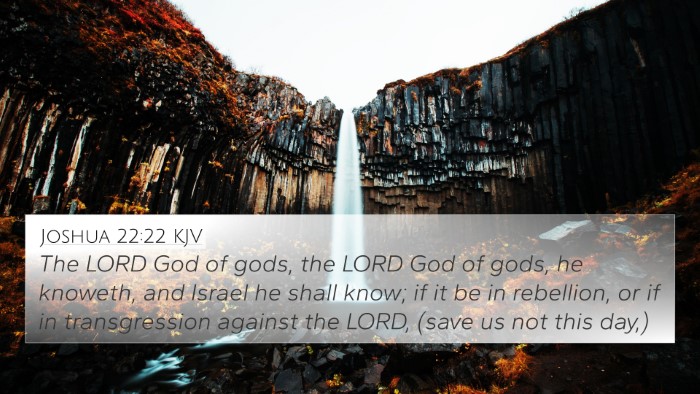Understanding Job 31:22
Job 31:22 states: "Then let my arm fall from the shoulder blade, and my arm be broken from the bone." This verse is a part of Job's heartfelt lamentation, expressing his earnest desire for divine justice and integrity in his life. Below is an exploration of its meaning, as drawn from various public domain commentaries.
Context of Job 31:22
In the broader context of the book of Job, this verse belongs to Job's final statement, where he responds to the accusations brought against him by his friends. Job insists on his blamelessness and the sincerity of his actions.
Commentary Insights
Matthew Henry's Commentary
Matthew Henry emphasizes that Job appeals to God's judgment. The imagery of a broken arm signifies that Job would rather suffer physically than be justly accused of wrongdoing. This reflects Job's commitment to righteousness and his fear of violating God's commandments.
Albert Barnes' Notes
Albert Barnes elaborates on the metaphorical significance of Job's plea. He interprets the mention of physical injury as an expression of Job's profound desire for God’s intervention in vindicating his character. Barnes notes that Job is metaphorically asking God to make a dramatic statement if he has indeed sinned.
Adam Clarke's Commentary
Adam Clarke posits that Job's challenge is not merely for condemnation or reward; rather, it is a passionate understanding of God’s justice. Clarke points out that Job's allegations against himself are meant to establish how firmly he stands against iniquity in his life.
Thematic Connections and Cross-References
This verse connects thematically with several significant Biblical concepts, emphasizing integrity, justice, and divine retribution.
- Job 1:1 - Job is described as blameless and upright, reinforcing his character.
- James 5:11 - Highlights Job's perseverance and the mercy of the Lord at the end.
- Psalms 26:1-2 - David appeals to God’s scrutiny of his integrity, similar in essence to Job’s appeal.
- Proverbs 10:3 - The Lord does not let the righteous go hungry, signifying Job’s trust in divine justice.
- Isaiah 30:18 - God longs to be gracious; Job’s plea indicates his desire for God’s grace.
- Acts 17:31 - References God’s appointed day for judging the world, echoed in Job’s cry for righteousness.
- 1 Peter 5:10 - Affirms God's restoration after suffering, a theme that resonates with Job’s plight.
- Romans 2:6-8 - Speaks to God's righteous judgment based on deeds, aligning with Job's concerns.
- Matthew 25:21 - The faithful servant rewarded; echoes Job’s desire for divine acknowledgment of his integrity.
- Hebrews 12:1 - Calls for perseverance amid trials, akin to Job’s heartfelt declaration.
Conclusion
Job 31:22 encapsulates a profound moment of anguish paired with a fierce commitment to personal integrity. Through a comparison and connection with other scriptural references, it highlights the larger biblical themes of suffering, justice, and the quest for divine validation. Understanding this verse through the lens of its cross-references provides a deeper insight into God's nature, the human experience of suffering, and the righteous hope for vindication.
Tools for Further Study
To fully appreciate the connections between these biblical texts, consider utilizing:
- Bible concordances to locate related scripture easily.
- Cross-reference guides which aid in connecting scriptures contextually.
- Comprehensive Bible cross-reference materials for in-depth study.
- Cross-reference systems that visually display relationships between verses.








